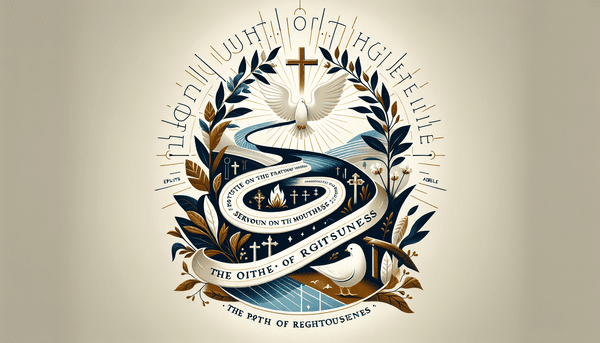Living a Life that Reflects God's Love
In the Sermon on the Mount, Jesus encapsulated the essence of Christian conduct. He urged us to 'let your light shine before others, that they may see your good deeds and glorify your Father in heaven' (Matthew 5:16). This poignant instruction calls us to live in such a way that our actions serve as beacons of God's love, drawing others towards Him. Moreover, Christ challenges us to embody a depth of righteousness that surpasses that of the Pharisees and the teachers of the law, a righteousness that is deeply ingrained in our hearts, and that leads to genuine transformation (Matthew 5:20). As we strive to live out these truths, we become a testament to the transformative nature of our faith, and through us, the world glimpses the love of our Heavenly Father.
Analyzing Biblical Texts
To truly grasp the richness of the Scriptures, we must immerse ourselves in the historical and cultural context in which they were written. Studying the Bible involves more than a cursory reading; it requires deep reflection on the literary style, theological themes, and the overall narrative. 'All Scripture is God-breathed and is useful for teaching, rebuking, correcting and training in righteousness,' as stated in 2 Timothy 3:16-17. By contemplating the profound messages within, such as the calling to be doers of the Word and not merely hearers (James 1:22), we not only gain knowledge but also learn how to apply these eternal truths to our daily lives.
The Dangers of Idolatry
Idolatry, the worship of false gods or images, is a danger that the Bible warns against repeatedly. It's a practice that can easily entangle us, leading us away from the worship of the one true God. The first commandment, 'You shall have no other gods before me,' (Exodus 20:3) sets the tone for a life dedicated to the true God. In a world filled with distractions, it's crucial that we remain vigilant, ensuring that our hearts and minds are set on things above, and that we are not ensnared by the idols of this age (1 John 5:21).
Discerning God's Will in Taking Risks
In our spiritual walk, we are sometimes called to take risks, to step out in faith beyond our comfort zones. Proverbs 3:5-6 urges us to trust in the Lord with all our heart and not lean on our understanding, which is essential when discerning God's will in uncertain situations. As we contemplate taking risks, we must ensure that our actions align with biblical principles and that we are prepared to trust in God's faithfulness, regardless of the outcome. Through such acts of faith, we learn to rely more deeply on God and experience His sovereignty in new and profound ways.
Conclusion
As we conclude this spiritual exploration, we are reminded that the Bible is more than a collection of ancient texts; it is a living guide that provides wisdom for every aspect of our lives. Whether we are analyzing chapters, observing the Sabbath, avoiding idolatry, enjoying hobbies, contemplating the Trinity, or discerning God's will in taking risks, Scripture invites us into a deeper understanding and a closer relationship with our Creator. Let us carry these truths with us, allowing them to shape our lives and our hearts as we walk the path of faith, bringing glory to our Father in heaven.
FAQ
Q: What does Matthew 5:16 mean?
A: Matthew 5:16 encourages Christians to let their good deeds shine before others, so that people may see their actions and praise God. It's a call to live out our faith in tangible ways that reflect God's love.
Q: What is the meaning of Matthew 5:20?
A: In Matthew 5:20, Jesus emphasizes the need for a righteousness that surpasses that of the Pharisees and the teachers of the law, meaning that it's not enough to follow religious laws outwardly. True righteousness comes from the heart and is reflected in a genuine relationship with God.
Q: How can I analyze chapters of the Bible?
A: Analyzing Bible chapters involves understanding their historical context, the original languages, literary styles, and theological themes. It also requires reflecting on how the teachings apply to your life and seeking insights from theologians and biblical commentaries.
Q: What should I do at home as a kid?
A: As a child at home, you can honor your parents, read and study the Bible, and engage in activities that help you grow in wisdom and understanding, reflecting God's love in your family and daily life.






